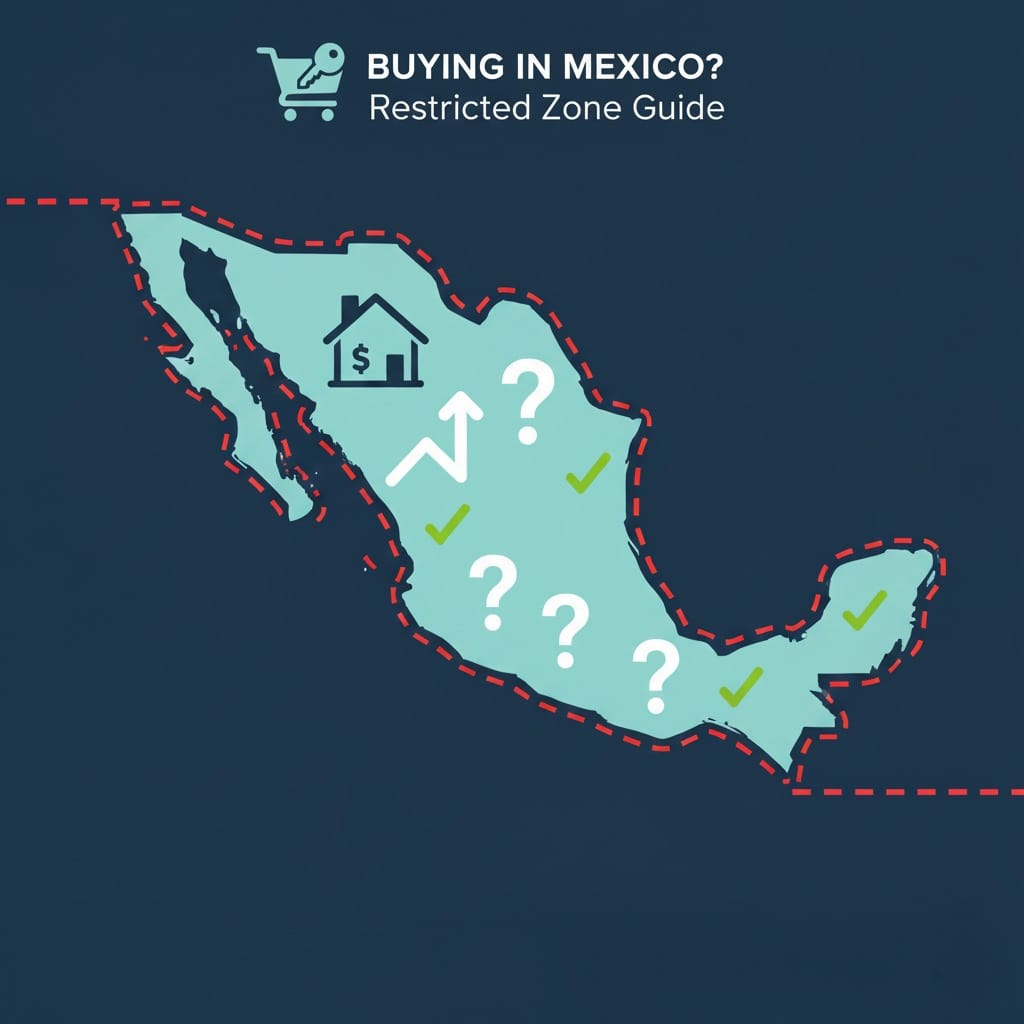Buying Property in Mexico’s Restricted Zone: A Guide for Foreign Buyers
Learn the two legal paths for foreigners buying in the restricted zone, including the Fideicomiso and a Mexican corporation.
Many foreigners dream of in the Riviera Maya. You may picture a beachfront home in Tulum or a condo in Playa del Carmen. However, when you start your search, you will quickly hear about “the restricted zone.”
What is this zone? Does it mean you cannot buy property?
This is a common question from foreign buyers. The answer is yes, you can absolutely buy property here. But there are special rules you must follow. This guide explains the two legal paths for foreigners to securely acquire property in Mexico’s restricted zone.
What Is Mexico’s Restricted Zone?
First, let’s define the restricted zone. This is not a dangerous area. It is a legal boundary based on the Mexican Constitution.
The zone includes all land:
- Within 100 kilometers (about 62 miles) of any international border.
- Within 50 kilometers (about 31 miles) of any coastline.
This rule was created to protect national sovereignty. Because the entire Riviera Maya is on the coast, it falls completely within this zone. As a result, foreign individuals cannot hold direct title to residential property here.
However, Mexico’s Foreign Investment Law created two safe and legal pathways to make foreign investment possible: the Fideicomiso and the Mexican corporation.
Method 1: The Fideicomiso (Bank Trust)
The most common and secure method for foreign individuals buying residential property is the Fideicomiso. This is simply a Mexican bank trust.
Here is how it works:
- The Parties: The trust involves three parties. You are the “beneficiary.” A Mexican bank you choose is the “trustee.” The seller is the one who puts the property into the trust.
- Ownership: The bank holds the official legal title to the property. But it only holds it on your behalf.
- Your Rights: As the beneficiary, you have all the rights of an owner. You have full control. You can live in the property, rent it out, modify it, sell it, or leave it to your heirs.
The setup process is straightforward and handled by a Notary Public. A Notary is a specialized lawyer who is mandatory for all real estate deals in Mexico. The Notary and your bank will get a permit from the Ministry of Foreign Affairs (SRE). Then, the Notary drafts the trust agreement and registers the property.
This entire process usually takes two to three months. A Fideicomiso has a 50-year term, but it can be renewed indefinitely, giving you and your heirs long-term security.
Method 2: The Mexican Corporation
The second path is to form a Mexican corporation. Common types are the S.A. de C.V. (a stock company) or the S. de R.L. de C.V. (a limited liability company) .
This method is very different from a Fideicomiso.
- Who It’s For: This option is better for investors with commercial goals. For example, you might use a corporation if you plan to manage multiple rental properties, run a business, or develop land.
- Ownership: In this case, the corporation holds the direct title to the property. You, the foreigner, are the owner of the corporation’s shares.
- The Process: You must still use a Notary Public to legally create the corporation. The company must then be registered with the National Registry of Foreign Investments.
Fideicomiso vs. Corporation: Which Is Right for You?
Choosing the right path depends entirely on your goals.
A Fideicomiso is almost always the best choice for personal, residential use. Its main purpose is to hold one property for you and your family. The ongoing administration is very simple. You just pay an annual fee to the bank.
A Corporation is a business tool. While it can be faster to set up, the ongoing compliance is far more complex. You will be required to:
- Hold formal shareholder meetings.
- File monthly and annual tax returns.
- Maintain official accounting records.
If you fail to meet these requirements, you can face serious fines and legal problems. For this reason, a corporation is usually not the right choice for someone who just wants a single vacation home.
A New Reality: The Impact of 2025 AML Reforms
A major update has changed the landscape for all buyers. Mexico’s 2025 Anti-Money Laundering (AML) reforms have made transparency mandatory.
This means the old idea of using a trust or corporation for “anonymity” is now obsolete.
- For Fideicomisos: You must provide full transparency about your identity and funds to the bank, the developer, and the Notary.
- For Corporations: You must fully disclose the “Beneficial Owner”. This is the actual human being who ultimately controls the company.
The most important change is the role of the Notary Public. Notaries are now a “much stricter filter”. Before any closing, they must demand an “impeccable client file” from the buyer. This file must prove your identity and, most importantly, the lawful origin of your funds.
Be prepared for this. This new diligence step can cause delays if you do not have your financial documents ready.
Buying in the restricted zone is a clear and secure process. However, it is not a simple one. Choosing between a Fideicomiso and a corporation has long-term legal and tax consequences. Furthermore, the new AML laws require careful preparation. Working with a specialized law firm is essential to protect your interests.
Facing a complex purchase in Mexico’s restricted zone? Don’t navigate it alone. Contact PeninsuLawyers to protect your investment and secure your property rights.



